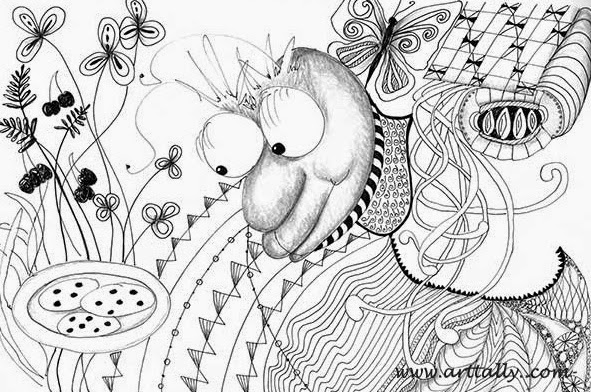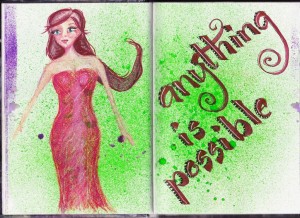Why your to do list is overwhelming (and what to do about it)
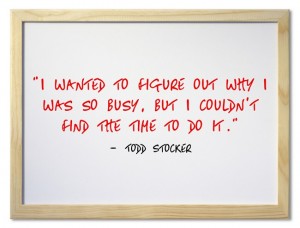 Be honest. How many free books have you downloaded but not yet opened? How many courses have you enrolled in but not completed? How many mailing lists are you signed up to that you don't get around to reading? Have you been promising yourself you would sail around the world one day, but still haven't done that? Planned to write a novel but still haven't got started?
It's not that you are lazy. In fact it's exactly the opposite. So much good intention. So much self improvement. But sadly, there are only so many hours in the day.
Be honest. How many free books have you downloaded but not yet opened? How many courses have you enrolled in but not completed? How many mailing lists are you signed up to that you don't get around to reading? Have you been promising yourself you would sail around the world one day, but still haven't done that? Planned to write a novel but still haven't got started?
It's not that you are lazy. In fact it's exactly the opposite. So much good intention. So much self improvement. But sadly, there are only so many hours in the day.
Our modern world delivers nearly everything we could possibly want, twenty fours of every single day. We see all sorts of opportunities for things we could do and learn and be. This can ignite our passions and fuel us on to explore such exciting possibilities. But just because so much is possible, it doesn't mean we have to do it all. And we certainly don't have to do it all today.
Most of us add an inexhaustive list of things we 'should' do, or things we 'could' do to our list of routine daily activities, like our actual jobs, feeding ourselves, buying that birthday gift for a relative, and so on. No wonder our to do lists feel overwhelming. In part it is because we may not have drawn that distinction between things we must do (like eat dinner) and things we might do (like learning a foreign language, say). So these extra tasks hang over us. They cast just a little shadow at first, and perhaps we don't notice them much, much less recognise what it is that is actually weighing over us. But eventually they become oppressive, especially when they accumulate.
So the first step is to figure out which of the tasks on our list fall into the 'might-do' category. One option is to create a separate list more appropriately titled, so that you can remind yourself that these are aspirational possibilities rather than chores you have still not completed. A second option is a suggestion from Arianna Huffington's new book Thrive. She says you can complete a task simply by crossing it off your list. You don't have to do everything. Really... you don't.
Another reason a to do list is overwhelming is that we are never quite sure we have done enough. We want to exercise regularly, meditate regularly, read more, improve a particular professional skill. We might even have been to enough training seminars to know that we need 'SMART' goals. This may mean we have set ourselves minimums, like 3km of running 3 times per week. Do this for all the tasks on your list and you have given probably set enormous expectations for yourself.
In itself that is not a bad thing, but we have to be fair to ourselves and aware of our current capacity. As James Clear points out, we should only expect that which is sustainable, by setting upper bounds as well as lower bounds. This is a lesson from the corporate world. Southwest Airlines chose to place an upper bound on their company growth in order to give themselves a margin of safety and avoid burning out. It seemed to work for Southwest, and it makes a lot of sense for us too as James Clear explains.
Figuring out how much of an activity is too much for us in a particular day or week, leaves us the space to rest and creates space for the next item on the list. It also may leave us with a better sense of accomplishment.
If your to do list overwhelms you it is a good indication that you need to go back to what is truly important to you. What are you goals and values? Now pick your top 3-5. Make sure every item on your list is in line with one of those 3-5 goals and values - if not cross it out, or at the very least put it on a separate list. Be kind enough to yourself to make sure you do not have unrealistic expectations. Life is too short for that.
“Busyness is not a reason for not getting other things done. It is an excuse for not claiming your true priorities.” Alan Cohen
Can you 'fake it till you make it' and still be authentic?
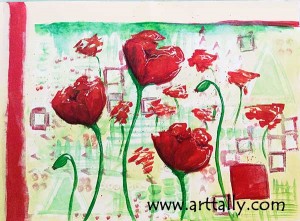 Whether you are reading about management, leadership or personal development, authenticity is one of those ever present buzzwords. We all strive for authenticity. But can being authentic prevent you from growing?
Whether you are reading about management, leadership or personal development, authenticity is one of those ever present buzzwords. We all strive for authenticity. But can being authentic prevent you from growing?
It comes down to what we mean by authentic. For most of us we think of this as having a clear sense of self, and staying true to that self. Making sure that you say as you feel, and do as you say. Your authentic self is your own unique blend of talents and attributes, the qualities that make you, you. It is not your qualifications or the things you think you should believe or be or do.
So what happens if you are trying something new and stepping out of your comfort zone? If you take up a more senior role, or branch out into a new area it seems inevitable that you will have some level of doubt, discomfort and lack of confidence. Don’t you need to ‘fake it till you make it’? Or would that be inauthentic?
If your answer was yes, then it is possible that your rigid view of authenticity could prevent you from growing. INSEAD professor Herminia Ibarra, suggests that the solution is to try and be more ‘adaptively authentic’. If we are too introspective and follow our old narratives too rigidly we are not giving ourselves permission to try anything new. We reinforce our existing stories and beliefs and limit our potential for discovering something different and possibly better.
To discover your authentic self you need to be clear about what it is that you value. Not what you think you should value, but what is actually important to you. Our past achievements are not these values. Hopefully what we have achieved is in line with our values, but these achievements should not become our sense of self. That kind of thinking drastically reduces the chance of further development.
For example, you might know that you are a good employee - you have been one before. You count it as an achievement. Being a good employee is as a result of your acting in accordance with your values of reliability, co-operation, diligence. But it does not mean you are only an employee or that it would be inauthentic to be anything else. Just because you are or have been an employee doesn't mean you can't become say, an entrepreneur. Focus on those values. Being reliable, cooperative and diligent can make you a good entrepreneur too.
Taking on a new role is going to feel uncomfortable - of course. The new entrepreneur is a beginner at being an entrepreneur and we all deserve to be able to give ourselves permission to be a beginner. Your authentic self knows you are a little scared and worried that you don’t really know what you are doing. I don’t think you need to be sharing that with the world to remain authentic. I think you can be aware of being a beginner, and be okay with that. Learn as you go, authenticity intact. There is a time and place to share your doubts. Choose that time wisely. Find a mentor and tell them... not your first client. When you get that promotion to manager don’t reveal your insecurities to your new staff. That’s not authenticity, it's poor management.
Social media shines the spotlight on the whole issue of authenticity. Celebrities and politicians are often under scrutiny for having artificial profiles on social media. But the reality is that we are all complex beings. We are all different things to different people. Do we really need to see every facet of a person in their social media profile… I think not. As long as we are clear on our own values and are acting in accordance with those values, being selective about what we reveal, when we reveal it and to whom is not inauthentic. It's just smart.
We grow by stretching the limits of who we are.
“Feeling like a fake can be a sign of growth” Herminia Ibarra.
Get yourself a colouring book....you know you want to
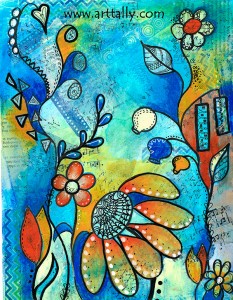 I bet most of the things on your to do list today are useful, important tasks. I bet they are mostly for everyone else. You are planning meals, collecting dry cleaning, meeting your boss’s needs, doing the school run. It’s all good. That’s what we do.
I bet most of the things on your to do list today are useful, important tasks. I bet they are mostly for everyone else. You are planning meals, collecting dry cleaning, meeting your boss’s needs, doing the school run. It’s all good. That’s what we do.
But you need something for you, too. Something just for you, that you do only for fun. Something that doesn’t really matter. Something you are not accountable for. Something you wont be judged on. Something easy, soothing, relaxing. It might even be your secret. But it doesn’t have to be. Like hundreds of chic French women, you might want to get yourself a colouring book.
No, hear me out…. A grown up colouring book. There are more and more of them available. In fact as I write this, the number one bestseller at www.bookdepository.com is Joanna Basford’s Secret Garden. Yes. It’s a colouring book. And guess what number 2 is? Joanna Basford’s orginal colouring book, Enchanted Garden. The top twenty bestselling books at the book depository currently includes no less than 4 adult colouring books.
Think of it as a purposeful activity if you must. A creative kickstart for some, like bestselling author, Joanna Penn. Joanna uses it as a way to get over a creative block and get writing again. It is an easy way to take the pressure off and soothe the muse.
But really, it is therapy. A way to relieve tension and anxiety. It's easier than meditating. Cheaper (and less intrusive) than a counsellor. Sitting down and colouring is pure escapism. It is active meditation. Mindfulness. The world slides by and you hear only the gentle scratch of the pencil tip on the paper. You feel the silky crayon glide satisfyingly over the paper. Glorious colours of your choosing wash the pixels out of your eyes. Who doesn't need a reprieve from those screens?
Remember when you put that first chunky crayon in your toddler’s clumsy fist? We watch our children delight in making marks and relish all that colour. We know it is good for them. That they are playing, learning, growing. As instinctively as they know what to do with the crayon, we know instinctively that we are nurturing them and their creativity. Why do we think we don't need or deserve that anymore?
I would be prepared to bet that you have plenty of juicy art supplies in your house already. You bought them for your children, didn’t you? When you were sitting at that restaurant and whipped out the crayons and paper to entertain your child while your order was prepared, you felt a twinge of longing to join in. A small twinge perhaps… suppressed… but it was there… you know what I am talking about…. You are not the only one - it is exactly how this whole project of mine got started.
So go on - get yourself a colouring book. Raid your kids’ art stash when they are asleep or at school. I can promise it will be fun. You know those scented markers are calling you...
Your life purpose is not that complicated
 Your life purpose is not that complicated, after all.
Your life purpose is not that complicated, after all.
Hundreds of thousands of books have been written on the subject of finding your life purpose. For many of us it is the pursuit of a lifetime. While they say that the unexamined life is not worth living, I am finding that too much examining is not much of life either.
So it is with considerable relief that I stumbled upon some of the most helpful advice I have found so far on a topic I spend a good deal of time pondering. The Teal Swan explains that all of us ultimately have the same life purpose - to find joy. And that to find your ‘passion’ and what you should be doing with your life all you really need to do is follow what brings you joy.
"Find out where joy resides, and give it a voice far beyond singing. For to miss the joy is to miss all" Robert Louis Stevenson
Identifying your life purpose doesn't have to be some grand decision or declaration about the whole of your life. It can be as simple as using this question in order to make the simplest decisions in your every day life. That is information I can use. A structure I can implement. It makes so much more sense to me. Pyramids aren't built in one sweeping gesture, great novels aren't written in a day. They build over time, stone by stone, word by word.
So if you want to know if you are living your life ‘on purpose’, all you need to do is ask yourself ‘what can I do today to bring joy?’. As a guiding principle this really works for me. Trying to identify and articulate your personal values, your passion, your purpose seems daunting. Overwhelming. But when trying to decide whether to say yes or no to an offer you receive, whether to go to place A or place B, asking yourself which alternative brings you joy is much easier to implement. It is also a way to use your intuition. To try to tune in to your own inner voice and figure out what brings YOU joy. Not what you think you should choose, what you have been conditioned to believe is the ‘right’ thing to do. Far easier to do this in each small specific circumstance than to try and identify one grand impressive purpose. One big thing that you are supposed to achieve in your life.
And then slowly, just like each one of those stones in the pyramid or words in the novel, these little choices made by following your joy, show you what your life purpose is. Because life is how we pass each day, not just our grandest achievements. Making the small decisions in line with the guiding principle of what brings you joy will lead you to your grand achievements.
Too busy or busy enough?
 |
| Abstract mixed media florals created in the online class 'Lifebook 2014' |
Hope when the moment comes, you’ll say “I, I did it all. I owned every second that this world could give……Yeah, with every broken bone, I swear, I lived” - One Republic
Getting started can be the hardest part of the task
 |
| Mixed Media painting created in the online class 'Lifebook 2014' |
Getting started can often be the hardest part of the task. Perhaps you have decided to go for a run today. The hardest part is actually making yourself put on your shoes and head out the door. Once you start, it's not so bad. In fact, you might even enjoy it. Maybe you set aside some creative time. Only now you are dithering between journal and canvas.... hmmm acrylic or watercolour? Perhaps your cursor is still blinking at the top of the blank page entitled 'Chapter One' ... Actually it's that voice of doubt that starts up at the beginning of the task that creates the inertia... you're not fit enough to get to the end of the street... you really dont know to handle watercolour... you write boring stories... this is going to be a waste of time that you could have spent doing something more useful, like the laundry.. So what to do about it? Here are four strategies you might like to try...
1. Just do it
Listen to the wisdom of Nike's marketing department and 'just do it'. Just start as quickly as possible. Get to the door right now without thinking about it, close it behind you and get running. Grab the first supplies you see and put pen to paper. Open that document and just start typing. The trick is in the speed. Not allowing time for the voice of self-doubt to get a word in.
2. Embrace the Doubt
Was it too late? Did those negative vibes creep in already? Give them their full voice. Grab a piece of scrap paper and write every negative thought, every possible reason for not doing the task, everything that might go wrong. Don't edit or format or worry about spelling - just spew it all out. Once you have done this you might just find that none of those reasons are convincing. You might even see what protective messages they convey, and be able to reframe them more positively. It might just make you more motivated than ever.
3. Bribery
Look... it works on five year olds, so it is worth a shot. Promise yourself a reward. Find the thing on your day's to-do list that you most look forward to doing and tell yourself that you will do that once you have finished this task you are struggling to start.
4. Instant Gratification
Try the polar opposite of the bribery strategy. Marney Makridakis says that "what moves us moves us". In other words, that task that you find enjoyable and fun, the one you are looking forward to will actually give you a bit more momentum. So do it first. If you really want to make a collage or splash around a bit of paint rather than this other thing you are putting off then go ahead. Doing the fun task will energise you and probably give you the boost you needed to take on the job you have been struggling to start.
Are you preparing or procrastinating?
 |
| Mixed media mermaid in a Dylusions Journal |
A little while ago Thing Two and I were both down with the the flu. We spent days on the couch, good for not much more than TV and tablets. Where would we be without the internet? I was feeling jolly pleased with myself, actually. I felt like I was rather productive despite being under the weather. I gave my Skillshare membership a real workout, taking classes on watercolour painting, pattern design and fashion illustration. I watched endless YouTube videos on art and ukulele tutorials and Eckhart Tolle's view of the world. I learned a lot. I was inspired. All of this is great if course, but I recognise it as a familiar pattern. We have no lack of information, having access to just about anything we want to know. But there is no substitute for doing. The first step is acquiring the information, but it is not much use if we don't start applying it. A bit of preparation is always going to be important whether you are starting a new business venture, taking up a new hobby or acquiring a new life skill. But there will always be another book to read, another online course to take, more data to gather. The preparation phase is an exciting place to be. But it is also a safe place. Fear keeps us from moving out of preparation into action. Preparation becomes procrastination. I don't think anyone feels perfectly ready, in reality. At some point, you have to declare your research sufficient, your training adequate. There will always be doubt as to whether you are going to sink or swim. The only way to find out is to jump in the water.
"Procrastination is opportunity's assassin." - Victor Kiam
Why time constraints may actually help you get stuff done
 |
| Art journal page created in Jane Davenport's online class Frolicaholic |
The other day I had one of those long to-do lists that leave you in doubt that you have any hope of achieving them all in 24 hours. Then a friend rang. A friend I hadn't seen in quite some time. A spur of the moment catch up was suggested. My favourite kind! The angel on my one shoulder shook her head. (She can be a little officious and bossy. In fact I am not even sure she is an angel.) Clearly she thought the sensible, mature thing to do would be to attend to the chores on the list. The little devil on the other shoulder was skipping from one foot to the other..." What to-do list?" No prizes for guessing who won. The curious thing is that I actually managed to achieve both. I met my friend and I did all the other things I had planned for that day. It turns out that the tasks on our to-do list expand and contract to fit the time we allot for them. Reducing the time available focuses the attention. It seems to be an effective way of encouraging the mindfulness that can be so elusive. With less time we let go of any ideals of perfection and complete the tasks with the minimum investment of time and effort required for an acceptable result. Which is actually the definition of efficiency. When ample time is available it is the possibilities that can be overwhelming. It is not dissimilar to that pristine new canvas or blank art journal page. A trick that I have learned from different art teachers is to impose some constraints. Pick only 4 art supplies at random and limit yourself to using only those. Every time you add a colour make it a rule to use that colour 3 times on the page. Overcome writer's block by setting a timer and writing anything and everything that comes into your head until the timer goes off. Constraints don't reduce creativity, they enhance it. If necessity is the mother of invention then constraints must be her big sisters or, at the very least, distant cousins. I think it is true what they say.... if you want something to get done, give it to a busy person.
3 problems with following your passions
 |
| Mixed media journal page created in Jane Davenport's online class Create Emotion |
There was a rather annoying woman I used to work with who used to trot about saying irritating things like, " Find a job you love and you will never work a day in your life". Well yes. That is what Confucius said. Clearly no one sets about looking for a job they don't like. Do they? If you have reached one of those flat spots in your life and are wondering how to shake things up a bit, it won't be long before you are advised to 'follow your passions'. If you are considering a career change the advice is usually to think of the things you choose to do in your spare time and consider pursuing those more seriously. In other words, think about your hobbies. What you choose to do as a hobby is what lights your fire, makes your life fun and enjoyable. Hobbies give you a break from the routine. They decrease stress - the bad kind, and promote eustress - the good kind, which gives you enough of a challenge to feel excited about what you are doing. There is the possible sense of accomplishment, without a lot of pressure. The fun is in knitting the beanie with your own two hands... it doesn't really matter if turns out to be hideous, does it? Presumably we are all agreed that work should ideally be fun. Something we enjoy. Something we actually want to do. So making your hobby into your job can only be a good thing. Or can it? I see at least three problems: 1. Making your hobby into work might just be a major passion killer
- what you love to do
- what you are good at
- what someone will pay you to do
Should you... really?
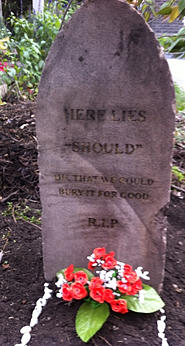 |
| Art Installation 'Here Lies Should' by Robyn deVries |
Sometime ago I was observing, in a conversation with a friend, the things that I thought I should be doing, what I should be content with right now. My friend shook her head.
Is letting go of control actually the best way to be more in control?
| Pen doodle that started with a random squiggle |
I have been to a lot of little girls' seventh birthday parties recently, and every one seems to include a mandatory, very loud and heartfelt group rendition (or six) of 'Let it Go', from the movie Frozen. I have taken it as a message from the universe as art seems to be trying to teach me the same thing. Let go of control. Not so very long ago I was a working mother of baby twins in the middle of my PhD. My coping strategy back then was total control freakery (it's a word, let's just go with it...) That worked, quite well even... up to a point. My idea of control was to be totally organised, everything scheduled and prepared in advance, meals, play-dates, laundry, research seminars, work tasks, everything. At one point I remember trying to plan for my planning sessions! Obsessing over planning and preparation means you are living in the future. It becomes harder to remain present, and you can start missing out on any of the joys of now. And if your belief is that you must be prepared for every eventuality, what you are really telling yourself is that you are incapable of handling life on the fly. It turns out that the only thing you can be certain of is that uncertainty is unavoidable. Being organised is great, it's important. But when you find yourself viewing unforeseen circumstances as a planning and preparation failure, you know you have gone too far. The thing is, the very skills you use to plan and prepare are the skills you will draw on when something unexpected turns up. We all possess the creative skills to make the best of such a situation, as it arises, without prior planning. But we have to have enough faith in ourselves to allow that to happen. Learning to draw and paint is teaching me as much about life as it is about art. Maybe more. Cheapest therapy ever. I have been drawn to doodling (ok almost addicted), and I think it is because I have been reflecting on this idea of going with the flow, letting go of how something is supposed to be and just working with what turns up.
I started the doodle on this page with a random squiggle in the middle of the page. That seemed to be a funny face, so a face it became. I felt like making some patterns so I did. Apparently I was hungry because some cookies and cherries turned up. It is a surprising relief to just 'be'. I am learning that you can make art without a preconceived notion of how it should look when it is finished. And you can live your life well, without a perfect plan.
If you want to start a new habit successfully, make it easy
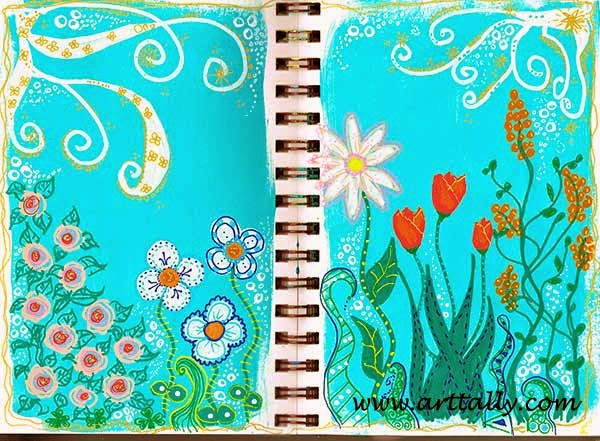 |
| Garden doodles created in Joanne Sharpe's Doodle Arts and Letters online class |
If there is a new habit to be started, then one thing I have learned is that it will never happen unless you make it as easy as possible. I don't think it is laziness, I think we are just busy. Once I bought one of those bits of fitness equipment from a TV infomercial (call it the folly of youth, or perhaps just plain hope). It said it would be easily collapsed and slid under the bed. Well, sort of. But in fact it was still way too hard to have to go scrabbling under the bed and erecting exercise equipment for that to have ever become a habit. Same with eating healthily. Unless the fridge and cupboards are stacked with readily available (no preparation required) healthy snacks, forget the sensible eating. The same seems to apply if you are wanting to draw and paint every day. My bustling family home doesn't accommodate a designated studio space. Nor would I want it to, to tell the truth, because I want to be with the rest of family rather than closeted away somewhere. And of course, were I to have such an art haven, there is a good chance I might never return from it...
 |
| My new art supplies trolley |
So my art, and most importantly all its supplies, must be well organised. The key though, is that they are readily accessible. I found the solution on Gina Lee Kim's blog (thanks, Gina!), in the form of an Ikea kitchen trolley. Best of all I went online and discovered its exact aisle location in the store. This meant I was able to go directly to the trolley without the marital assault and parenting skill test that is the full scale tour of Ikea. Hurrah! Now all my essential art supplies are on this robust trolley, able to be wheeled about. Importantly, none of my pencils, pens or markers are still in their original packaging. This, I learned from Lovely Jane. Art supplies should be out and proud, not hiding in their packaging. Mine are able to glint flirtatiously at me for most of the day, and this alone helps me to find or make the time to use them. Its easy. That's the way to do it.
Right-brain or left-brain?
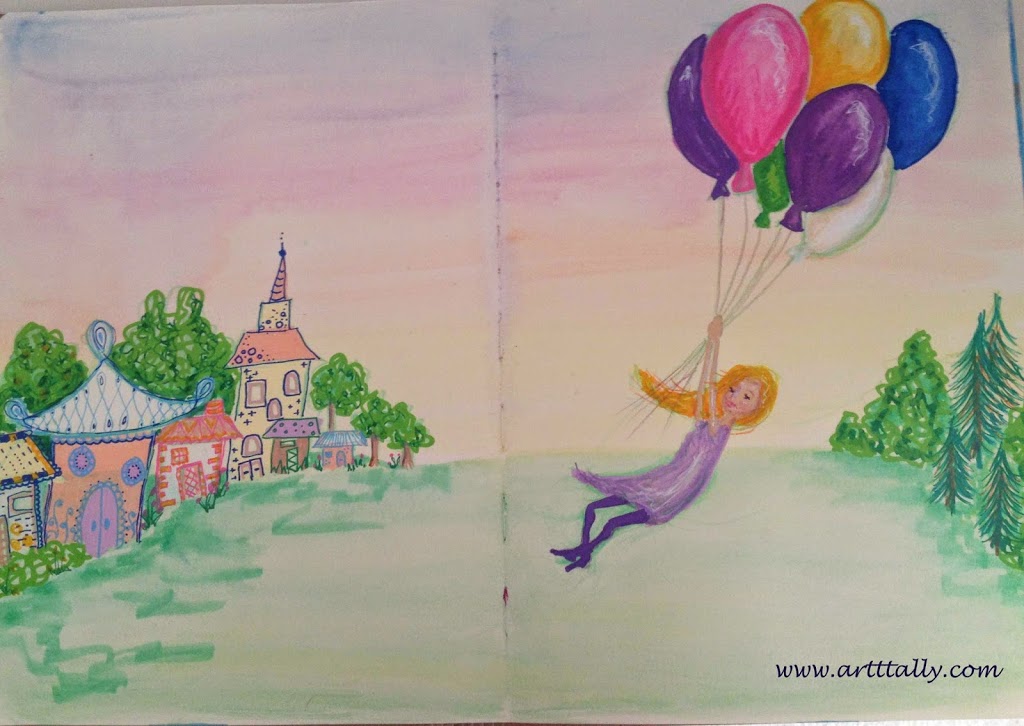 |
| Mixed media 'balloon girl' in my art journal |
I have been attending the right-brain virtual business summit. Being immersed in the world of creative people is rather delightful, but I must admit the whole idea of categorising people as right or left brain, gives me pause.
And as much as I love joining this band of 'right-brainers', I can't help wondering whether I am something of an imposter among them - a right-brain wanna-be. Or is it the opposite, that these creatives are in fact my people and I was never going to be comfortable in a left-brain dominated field? I have spent such a large part of my life utilising logic and analysis quite successfully, so that can't have been a complete misfit, can it?
The answer came from the right brain business summit itself. Like most sensible advice, once I heard it out loud it seems fairly obvious. Melanie Duncan (one of the speakers) said that we should give ourselves permission to be both creative and analytical, and avoid pigeon-holing ourselves.
I think that is the problem with labels. We all love a classification test, whether it is Myers-Briggs personality tests, Cosmopolitan relationship tests or the test to determine which Big Bang Theory character you most resemble. They are fairly irresistible, particularly when you have actual pressing work to do. And of course, they can be helpful in identifying one's strengths and weaknesses, but I think they also run the risk of feeding some of our limiting beliefs. However scientific the tests are, I have a hard time believing that they will all be spot on, all of the time. I would very much like to think that I am a deeply complex being, incapable of being classified. (I think there is a personality type for that.)
In truth, the idea of having one dominant side of the brain is a myth that is now disproved. There is some evidence that better performance comes when both parts of the brain, logical and creative, work together. So far from feeling I have no right to be employing skills from the 'other side' of the brain, I should be embracing them.
If you do not change direction, you may end up where you are heading. Lao Tzu
We deserve a little bit of luxury every day
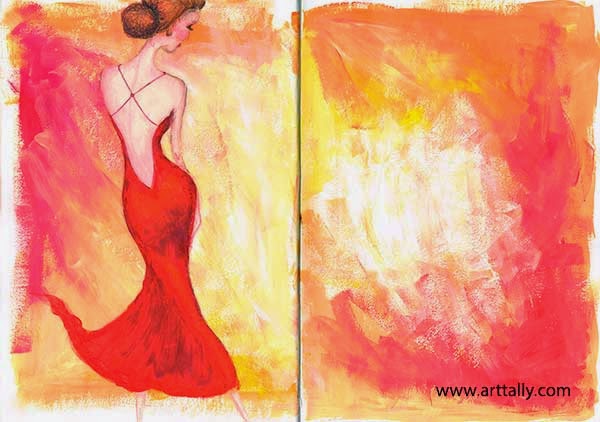 |
| My favourite journal page created in Jane Davenport's I Heart Drawing class, using lots of different acrylic paints! |
I think it is time to get out the 'good' glasses. You know, the ones reserved for 'company'. The ones we would use with the best plates after entertaining guests in the 'good lounge'. Why do we do this? If we have extra special things, why do we save them for other people? Are we saying these other people are of greater value than we accord ourselves? And, if we spent extra money on them, are we really getting value for it if they remain carefully stored most of the time and are brought out maybe only a few times a year? Doesn't seem likely.
And it's probably not just crockery and glass ware. What about that pair of designer shoes, still in the original shoe box, too special to be worn?
How about those deluxe pantry items... truffle oil, perhaps? Pomegranate molasses? Saffron? Those ingredients that languish on the shelf (probably until their expiry date) waiting for an important enough occasion. Like the big prime beef rib joint that seemed a good and festive idea but now strikes fear into your culinary heart. All you can think of is what a waste it would be to mess it up now. What pressure! No thanks.
The reason I started thinking about all this is that I notice I am doing the same sort of thing with art supplies. Tenuous distinctions are being drawn between different brands of acrylic paint. The superior artist quality ones are kept for special canvases and not intended for art journals. There is 'craft' quality paint for that. And children's quality paint kept for, well, the children obviously. Of course, I don't have every colour in every brand of paint. I found myself floundering and confused in the middle of my painting, recently. I realised the frustration arose because I wanted a particular colour in my art journal that I only had in my fancy (i.e. seldom utilised) canvas paint. Oo what to do, what to do? Well, that is ridiculous left-brain thinking for you.....
You can put the accountant in the studio, but can you put the studio in the accountant, she wonders....
So I am not going to do that anymore. Paint is now paint, in my house. I'm mixing it up in happy mixed media style. The good, the bad and the frightfully expensive. Anything goes. The best things happen when you paint like a child, I think. We deserve the joy of using our 'special' things. And if they are so precious that we can't bring ourselves to use them, we really shouldn't have bought them in the first place.
Creating something useful is very satisfying
 |
| Front cover of my handmade book |
It could be that I felt I needed to atone for my recent perceived destruction of old books that I turned into art journals. In the world of mixed media art journaling, this is called 'altered bookery' apparently, and I wrote about it here a little while ago. My guilt dictated that I should confess what I had done, perhaps.
Anyway, shortly after that I discovered book binding. Not just a chance to play with pretty paper, not only the opportunity to make something useful, but also a chance to purchase..... oh yes..... more art supplies.
 |
| Coptic stitch binding |
Binding my own book pleased me on so many levels. For me, a big part of the delight in doing something creative is actually creating something, something that before your action did not exist. I suppose that it existed, but not in that particular form, so maybe it is more like alchemy. Alchemy seems pretty close to magic. And I think that is why I like baking so much too. One minute you have gloopy, transparent egg whites and a bit of sugar. With a bit of time and effort, you can completely transform these simple ingredients into magnificent crisp, shiny meringues. Similarly, some pretty paper and waxed linen thread can become a custom, unique, handy notebook. Hurrah!
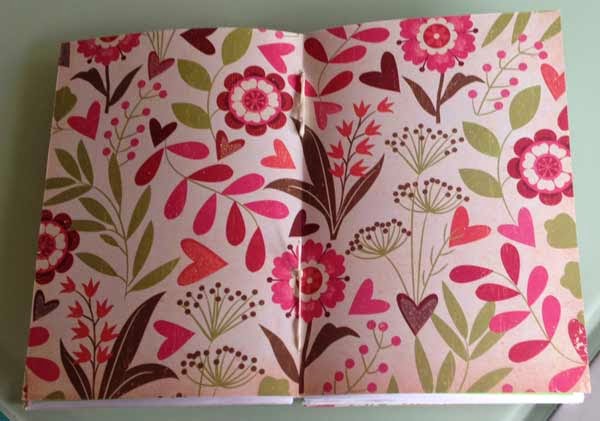 |
| Pretty paper for some of the pages |
In The Creativity Cure, Carrie Barron explains that our modern lives no longer require the creative engagement that used to be necessary in our day-to-day activities. We don't need to use our own hands to make or repair things any more, most of what we need is easily accessible. Sometimes we engage in creative activities for the pleasure of the process itself rather than for the finished product. We doodle in the margins of our notes because it is fun, not because we need a completed page of doodles! Creating for process is important too, but it is different from being committed to producing an acceptable output. Those stakes, the necessity, is what results in the sense of achievement felt on completing the project satisfactorily. Making a book gave me both: the fun of the process and a finished product with a practical use.
As is the case with pretty much anything you might want to learn these days, there is a generous expert or two prepared to show you exactly how, with the aid of You Tube. My preferred expert on the matter of DIY bookbinding is Sea Lemon. She has provided clear videos for all aspects of the process: making the covers and signatures as well as the coptic stitch binding which I really like. I am rather keen on needlework, but as much as I like doing embroidery I don't seem to have too much need for embroidered thingamabobs. So this scratched the stitching itch just enough without leaving me searching for a purpose for my lovingly needle-worked creation.
The cathartic practice of keeping a daily journal
It seems to have been getting increasingly noisy in my head. Every mum probably knows what I mean. I think it is inevitable when you find that, on top of your own, you are keeping every family member's schedule, diet and personal comfort in the back of your mind. Did the kids take their jumpers to school today? Have we eaten way too much red meat this week? Which night did Beloved say he would be late home this week? If you add to all of that the usual mid life crisis stuff like...what is it all for? what is my life purpose? did I really think I would exercise three times this week? shouldn't I have achieved more in my career by now? is this what I really want to do for the rest of my days? ...then what you have in your head is a veritable cacophony.
 |
| Mixed media painting created in the online class 'Lifebook 2014' |
I'm happy to say that I have, quite recently, found something simple which seems to be rather helpful. It is advice that I have seen in various guises from the woo-woo to the scientific. Julia Cameron, in 'The Artist's Way', calls it morning pages, and describes it as "meeting your shadow and taking it out for a cup of coffee". Carrie Barron M.D., in 'The Creativity Cure', calls it 'insight' and the online journal provider Penzu says it is just plain good for you.
Essentially, it is journaling. It is a daily practice of writing out whatever is in your head, in whatever format it tumbles out. No regard for spelling, grammar, punctuation or even good sense. Nor in fact do you need to re-read it. And no one else need look at it either. It is like that thing people sometimes suggest you do to vent your anger at another person, when it is unwise or impossible to do so in person. Have you ever been told to write a letter to someone you feel has wronged or hurt you? To say everything you want to, in whatever language you choose? Usually, the advice is then to destroy the letter. The point is not for it to be a communication device. Carol Tuttle talks about the the healthy, open throat chakra that needs self-expression. Not to be heard, but simply to express itself, to release that energy. I know... if you are not of the incense-burning, yoga and lentil, new age persuasion you were probably rolling your eyes at that.
But believe me it is a strangely cathartic experience. I have been using Penzu, which is contrary to Julia Cameron's advice, that long-hand writing works better, but I find that my typing better matches my speed of thought compared to my lazy handwriting. Somehow, writing out 1000 words per day of this stuff really calms the chattering monkeys in my head. I used to say some of this out loud to long-suffering family members, but I don't think this actually reduced the white noise in my head, and can't have been a great experience for the unsuspecting family member either! However, spewing it out into a journal, probably never to be read again, somehow does help. Once I have jettisoned that inevitable but unnecessary baggage I can actually function again. The feeling of not being able to see the wood for the trees dissipates and I can figure out my priorities for the day. Along the way, the odd good idea pops up.
This, I think, is a good habit I am very pleased to be acquiring. How about you - do you keep a journal?
Is it possible to be disciplined without a deadline?
 |
| Tiny journal page from my latest online class 'Draw Your Awesome Life' |
I have been feeling a bit overwhelmed by being a bit behind on my online classes. On the one hand, there is really no such thing as being behind. The classes typically have long access, 6 months, a year or 'forever' access. So actually you can complete them in your own time. On the other hand, there is a lot to be said for the sense of satisfaction that comes from completing something promptly. A bit of structure is important I think. Does one actually need a deadline of some sort in order to be disciplined enough to complete the task?
I remember in high school I had a maths teacher who said she would happily correct our homework if and when we chose to hand it in, but that was up to us. I could so have got a better mark for maths. I blame her. I don't want my art classes to end up like high school maths, left to last because other things had more urgent deadlines. So with the weight of those uncompleted art assignments added to my maths homework (which I have obviously still not done), I sighed and started web browsing.
Before I knew it I had... signed up to another class! I know, but it seemed logical at the time. And this class is different. (Not really). Well, a little. It is completed in a tiny watercolour journal. Hurrah, I had one of those knocking about already. It is even a Moleskine and I have had no idea what to do with it since I bought it several months ago.
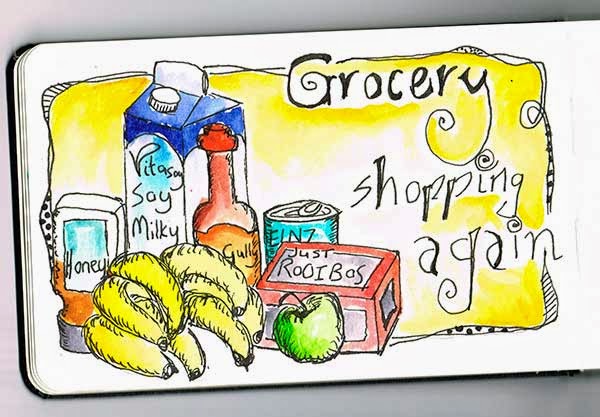 |
| Another tiny journal page created in 'Draw Your Awesome Life' |
This class is called Draw your Awesome Life, by Joanne Sharpe. Each lesson video is brief, maybe even 5 minutes or so, and since you are working in a tiny journal, the page can possibly be completed in 10 minutes. Even if you sit down with a cup of tea you will probably be only half an hour from the start of the lesson video to the completed page. That's not to say that I don't love the long detailed lesson videos I do in other courses. Of course, they are fantastic too. But these little bite-sized lessons offer very achievable, happy journal pages, for de-stressing. There is a time and place for all of these things, don't you think?
Qweeting: motivational benefits and art inspiration
The other day, I was at the hairdresser boning up on frivolous current events, as you do. I love this actually - it's my chance to read magazines I wouldn't usually buy. Also, I am captive for a while and can't really be asked to be doing something more productive or useful with this time, so it is proper 'time out'. Sometimes I learn a thing or too... like a new urban word. For instance, until then I was unaware of this thing called 'qweeting', which apparently describes the action of tweeting a quotation, something some one else has said. And yes indeed, it seems to be a rather popular pastime. I myself don't have too much time for the pearls of 'wisdom' offered by the latest starlet, supermodel, or D-list celebrity. There are though, plenty of qweets of favourite lines of poems or books and many an inspirational or motivational quotation. These, I do like, and the article I read in the hairdresser's (speaking of dubious sources of wisdom...) was suggesting that that this sort of qweet is beneficial for both those posting them and those reading them. Both are reported to benefit from greater motivation, less procrastination and a more positive outlook. Well, there you are then, it can't hurt, can it?
I have also found that a funny quotation, like the Helen Rowland one from my Sugar Diva painting, or a favourite poem, or even a woo-woo affirmation gives me a bit of inspiration for something to draw or paint. In fact, I think one of the first drawings I did that felt like it came just from me and not from the homework from an online course or a prompt from a drawing book was this little lady here. When I heard these words, it was she that popped into my head in all her earnest teenage awkwardness, and I loved letting her out of my pencil.
She is a work in progress, though, she is just in my sketchbook currently. She needs a background and I am toying with the possibilities right now. I could do a lovely messy mixed media background and then redraw her onto it. This thought causes some unease, but Lovely Jane always says that if you drew it once, you will be able to draw it again. I have also been meaning to play with acrylic transfer using matte medium and this might be a good opportunity to do so. Hmmm, so many options...
Finding your passions
You probably can't come within a mile of a mid-life crisis without hearing that you should be 'finding your passions'. Like much self-help pop psychology this is more broad concept than specific solution. What is it that really lights your fire? Gee, how could you have got this far in life without knowing this?
That emotive word, 'passion' makes you feel somehow deficient for not having, or at least not being able to articulate, something apparently so vital to your well being. It's terribly dramatic, being asked what your passions are, don't you think? What pressure! It seems apt for those of us who are typically boisterous, exuberant, excitable people. But we aren't all like that. 'Passion' probably looks different for different personalities.
And perhaps it is more like your favourite dress. The one about which you say 'I love this dress'. Not 'love' as in the trembling knees, palpitating heart, couldn't-possibly-live-without-it sense, you just mean that you really like it, and feel good in it. That's what we want to find. Something we feel happy doing, something that connects to our authentic selves.
So if you have been searching for your 'life purpose', your 'passions' to no avail, maybe you should give yourself a break. Maybe it's those grandiose terms that are misleading and just a little scary. Let's give it another label. Ken Robinson has a better suggestion. (Yes, I know I have written about Ken before, but he makes a lot of sense!) His counsel is to 'find your element'... now that seems much more approachable, doesn't it?
The Fertile Void
"How are you?" asks Wise Friend, a fellow mum, at school pickup.
Erm...I know this is not supposed to be a difficult question. A myriad of one-word answers burst like bubbles in my head. Confused. Elated. Panicked. Insane. Fuzzy. I blurt out, "I just applied for a career break. So..... I'm not sure.... I cant really tell up from down at the moment..."
"Oh, that's brilliant!" says Wise Friend.
"Is it...?" I smile weakly, hoping my eyes aren't looking too manic.
"Yes", she says, "you're in the fertile void - its a great place to be."
The chattering monkeys in my head hush for awhile. They seem to be thinking about this. Their momentary silence is quite refreshing. The Fertile Void... its a Thing. Its amazing how comforting a label can be. No longer am I in limbo - I'm not flotsam being buffeted about in a swirling mass of uncertainty. In fact, I'm in the fertile void, a place of infinite possibility.
As I reflect on the impact of this more positive re-framing of my choice, I realise how much weight I have accorded the various titles or labels I have assumed with each job I have undertaken.
I started out on a 'sensible' career path in part to appease my parents and in part because of the absence of any obvious life-purpose (which I think seems fair enough at age 18). Stepping onto that path is more like stepping onto a treadmill or a conveyor belt. You are on your way to becoming a.... (insert label here). You must be successful if you are now a ..... (insert label here). When people ask, 'what do you do?', you have a glib, instant answer, "Oh, I'm a .... (insert label here)"
And there you are, before you know it, you are what you do. Part of your self worth is attached to the institution that employs you. How curious, if this was not something that you necessarily chose, consciously, all those years ago....
So, absent this affiliation to the lofty institution to whom I have given my most recent ten years of service, who am I, I wonder?
What a fascinating question to explore.
And how lucky I am to have the opportunity to do so.
"Leap, and the net will appear" John Burroughs

